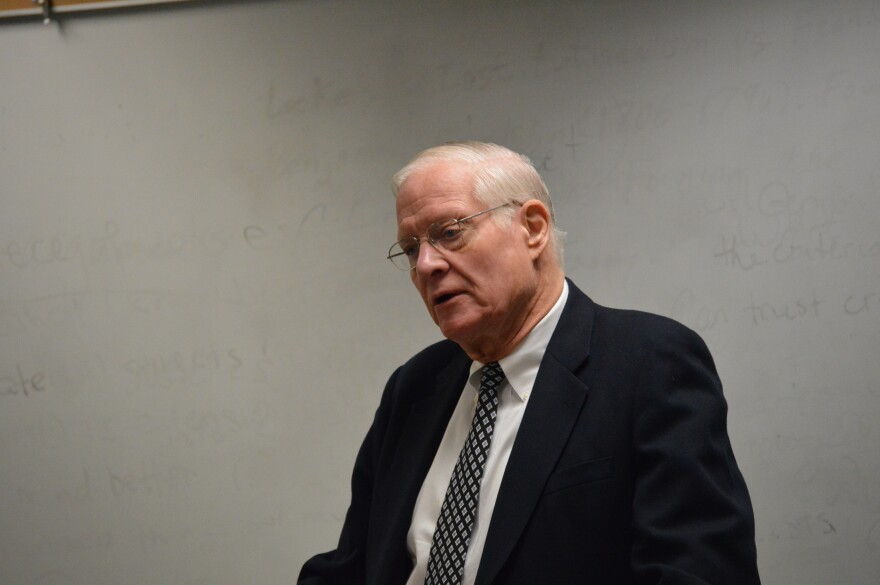Anthony Cordesman is a defense analyst at the Center for Strategic and International Studies. He visited Cape Girardeau on February 11, 2015 to speak at Southeast Missouri State University.
He dropped by the KRCU studios to talk to KRCU’s Jacob McCleland about the self-proclaimed Islamic State (ISIS).
Some interview highlights:
ON PRESIDENT OBAMA’S REQUEST FOR WAR POWER AGAINST ISIS:
At a given point under the legislation, the president should ask for authority. So it is not necessarily a major strategic change. He also set out the basic structure of the strategy he was going to pursue both in the new national strategy document and in the budget request before he is sending this forward.
But the key here is a set of assumptions which we are trying to turn into a reality but where we face major uncertainties. For the air effort that we now have underway, which has produced a very large number of sorties since August, to succeed we have to rebuild Iraqi ground troops. But we have to do more than that. We have to achieve some level of unity in Iraq between Sunni and Shiite Arab. We have to reach some level of unity between Kurd and Arab. This is a political action. If we can do that and rebuild Iraq’s ground forces, if we can bring Sunnis back into Iraq as a state, then a combination of air power, advisors, modern military equipment, may well be able to push the Islamic State out of Iraq. But there are a lot of conditions there. It’s an uncertain strategy.
And when people talk about putting boots on the ground, ground forces, I think sometimes that gets confused with going back to the major combat units we had inside Iraq before 2011. To the extent there’s a debate today, it’s really about whether you put advisors forward. You put specialized U.S. military units - special forces, area experts, trainers, combat leaders - into the Iraqi forces that have to actually have to fight because historically those advisors are far more critical than the ones that take people through training, get them familiar with the equipment. But it means casualties. And casualties are something where there should be a public debate.
The other side of this equation is far more difficult because while people focus on the Islamic State, it’s only one of the extremist movements in Syria. The movement which defeated the moderate rebel groups we done most to back last November was the Al Nusra Front. It’s tied to Al Qaeda. We used cruise missiles against a third group, called the Khorasan Front.
And the fact remains that most of the casualties of the violence, the most serious fighting has been between the Assad forces and the rebel forces as a whole. I mean, we’re talking by U.N. estimates nearly half the population of Syria is at risk. You have some twenty, or twenty-two million people more than three million refugees, seven million people displaced. That is not something where we again can either solve this with either air power or putting in combat forces. And it’s not clear in Syria’s case how we create rebel forces that will have the leverage and capability they need, and how serious we can even be about trying. So we are talking not about a war against the Islamic State. We’re talking about trying to end a set of civil divisions and conflicts in Iraq about dealing with a range of Islamist threats that are now in Iraq and Syria, and dealing with an ongoing Syrian civil war where the worst side is secular and under Assad.
ON THE CHOICES FOR ALLIES IN SYRIA:
I think out of the factions you see today, you would certainly like to have much stronger rebel moderate factions. I think in fairness there are many people who think we could have had those if we’d acted decisively earlier on. But I also think it’s very important to understand that the forces that have created this civil war, is as often the case, don’t represent by any sense the majority of the Syrian people. And that perhaps is the saving grace, that these extremist, conflicting forces ultimately are going to give way to what is one of the better educated, more moderate populations and they will eventually have the power and capability to bring Syria back to the kind of country it should be.
ON HUMANITARIAN EFFORTS:
The United States is pressed very hard. We are probably the major donor from outside the region by far. We have put aid personnel into the countries around. We have worked with the United Nations. And certainly the United Nations has had a major impact, not simply on refugees along with host countries like Lebanon, Turkey, Jordan and others. It has, with the support of the United States, and Europe and other countries, been able to put pressure on factions inside Syria to open them up to aid. One of the key goals of U.N. diplomats is to have that aid flow into the areas that are sort of surrounded by the Assad forces and rebels. Success has been very mixed, but the pressure has always been there.
But one has to be realistic. When you have three million people often at this point living in tent camps in this region in the winter, there are serious limits to what you can do. When you have over seven million people displaced away from their home and their jobs and their children’s education and their medical services, you have a massive humanitarian tragedy. And regardless of what we do, the question is, what happens? How do you rebuild the country? How do you give these people a future, not just a immediate security? And in all of those areas, it is, perhaps, one of the worst humanitarian disasters in modern times.

